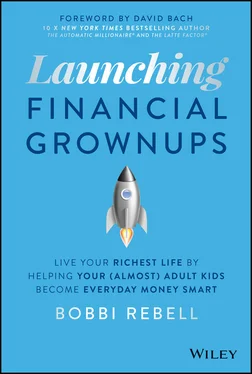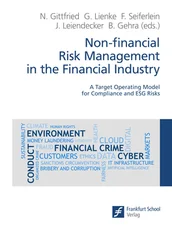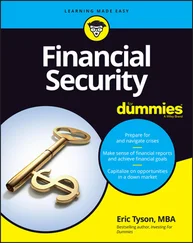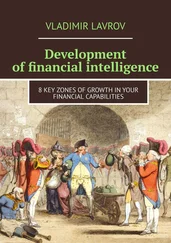Bobbi Rebell - Launching Financial Grownups
Здесь есть возможность читать онлайн «Bobbi Rebell - Launching Financial Grownups» — ознакомительный отрывок электронной книги совершенно бесплатно, а после прочтения отрывка купить полную версию. В некоторых случаях можно слушать аудио, скачать через торрент в формате fb2 и присутствует краткое содержание. Жанр: unrecognised, на английском языке. Описание произведения, (предисловие) а так же отзывы посетителей доступны на портале библиотеки ЛибКат.
- Название:Launching Financial Grownups
- Автор:
- Жанр:
- Год:неизвестен
- ISBN:нет данных
- Рейтинг книги:5 / 5. Голосов: 1
-
Избранное:Добавить в избранное
- Отзывы:
-
Ваша оценка:
- 100
- 1
- 2
- 3
- 4
- 5
Launching Financial Grownups: краткое содержание, описание и аннотация
Предлагаем к чтению аннотацию, описание, краткое содержание или предисловие (зависит от того, что написал сам автор книги «Launching Financial Grownups»). Если вы не нашли необходимую информацию о книге — напишите в комментариях, мы постараемся отыскать её.
Launching Financial Grownups
Launching Financial Grownups
Launching Financial Grownups
Launching Financial Grownups — читать онлайн ознакомительный отрывок
Ниже представлен текст книги, разбитый по страницам. Система сохранения места последней прочитанной страницы, позволяет с удобством читать онлайн бесплатно книгу «Launching Financial Grownups», без необходимости каждый раз заново искать на чём Вы остановились. Поставьте закладку, и сможете в любой момент перейти на страницу, на которой закончили чтение.
Интервал:
Закладка:
I made sure he was the one to give it to the bank teller. I made sure he showed me the total. I took photos. With his permission, I shared it on social media. We talked about what he could buy with the money if he wanted. But I'm still not sure he “got it” because it wasn't something that hit home. He didn't need cash to buy anything he wanted; it was all online, and the Xbox doesn't take pennies.
The lessons our kids first learn about money are priceless and effective for their purpose. As they go through their teen years and move into their twenties, we have to adapt and find new ways to make money lessons relevant to them as their world changes. For me, this has meant getting my now teenage son a debit card, where I can create incentives for him to earn his allowance, monitor how and where he spends his money, and teach him about saving and investing on an app. We may not like that our kids live their lives in front of little screens, but we'll get further if we meet them where they are.
Parenting expert KJ Dell'Antonia, author of How to Be a Happier Parent and former editor of the New York Times parenting column “The Motherload,” uses the same debit card and app that I use, Greenlight, with her kids. “It's working really well because the kids – they do get, they do keep track of what they spend.” The app allows parents to approve how and where their kids can spend money, sends a notification when a transaction takes place, and creates a digital system for spending, saving, giving, and even investing – echoing Lieber's recommendation, with the added bonus of it being on their phone, where their eyes are. Dell'Antonia says it is also more relevant to future financial grownups because it facilitates spending where spending happens: the internet. “They can use it on the internet to buy things. That was what was really hard for me for a while, figuring out how to give them responsibility because you can't get them a credit card.”
Incentives Matter
Parenting expert Allison Task's stepdaughter had agreed to pay for half of her new phone. At first, there was no timeline and no consequence if she did not pay, so she simply kept putting it off and making promises that she would get to it. Then Task had an idea and wrote her a note that read, “I've made a mistake. Starting January 1, we will be charging you interest, and we'll be happy to explain how that works, but we've made a mistake.” What happened next? “Oh my God,” Task said. “Done in half an hour. She sent us a check for the full amount she owed us because she had recently started working at a local restaurant.”
That little note enforcing what they had already agreed on, with a financial consequence, did so much to teach Task's daughter the importance of paying a loan and avoiding the consequences of nonpayment: interest. That lesson also protected her daughter from paying a higher price in the future, including having bad marks on her credit report and having to pay higher rates for loans on everything from cars to a new home.
It would have been so much easier for Task to just say, “Oh, she's working so hard and earning so little at that restaurant. Let's not bug her to pay off the phone. We aren't hurting so much for the money and she's such a good kid.” And that is the point: If you are like me, you have so many regrets about things you should have stopped doing or could have done better but just have not.
It's easier not to bring it up and risk a confrontation, especially with often moody teenagers. Sometimes we go too hard on our kids, but often we take the easier path for us and smooth the way for our kids rather than have conflict. It's also easier not to bring the kids when you are shopping, even if it would help them understand why you are always complaining about the growing expense of gas, groceries, and other stuff. It is easier to buy them clothing online. But then when they see you hit “buy,” do they really understand what's going on financially? Will they be ready when it's their turn?
We can all be more like Task and course correct when we see our kids aren't getting the message. It is often because we aren't sending the message. Once she realized this, Task was firm and reasonable and got the response she needed.
The Big Picture
Society is ever changing, and sometimes the harsh truth is that these changes will impact our children's ability to earn and have the money to pay for the life we have set them up to expect. We have the best intentions when we tell them they can be anything they want to be, but then maybe we exclude important caveats to that life if they decide to pursue their passion as a career. For example, if following their passion requires working in the gig economy, where they will not have a full-time, traditional corporate job with benefits like health insurance and retirement plans, it may never allow them the lifestyle they had growing up.
If we share our concern, there is a good chance they will say they are okay living with less. Many of our kids are honestly not as interested in material goods as we are. They can do without designer clothing and may even make peace with not updating their phones as often. That is their truth for where they are in their life.
The problem comes when they have to be financial grownups.
I remember joking (okay, also crying) years ago with my sister when my husband and I had to spend $6,000 we really didn't have to replace a septic tank in the yard of a house we were trying desperately to sell during the 2008 housing crisis. My sister had a similar high-priced expense with her home that was also not optional. We commiserated that we would never spend that kind of money on something like a designer handbag. We probably would even look down and judge someone who did (which you should not do – everyone can do what they want with their money). Now here we were, facing a very real grownup money situation, and we had no choice but to come up with the cash. It was painful, and it was not the last time I have been “forced” to pay for something I didn't ever imagine I would have to deal with as a grownup. I would complain that it wasn't “fair” that this is where our emergency savings was going. Are you nodding along with me on the “Life isn't fair” cliché?
Our kids may not want a ridiculously priced handbag or a fancy sports car, but they probably will need to have the money to fix the leaking septic tank or deal with whatever involuntary expense hits them when they are adults. They will need reliable income. They will need an emergency fund. As adults, they will need to know enough about budgeting to spend less than they make and not run up debt. They will need to know how to pay taxes, bills, and other expenses. They will need to understand how to read their paycheck and how to set up their company benefits. They will need to save money for retirement and to save money for life before retirement. They will need to know how to get and keep a job or a client, how to be able to buy or rent big things like cars and houses, and certainly how to buy insurance and other grownup financial products. They will need the education, financial literacy, and confidence to make tough money choices and will probably need you to be there for them when you can.
Most important, they will need to be ready-enough for the day you can't be there for them .
We need to accept that that is a good thing. As tough as it may be to hear, the ultimate mark of successful parenting is for your child to no longer need you. It won't mean they love you any less or want to be with you any less – but they have to be able to be okay without you.
Yes, like many of you, I am devastated at the thought of that. It's hard to let that part of parenting go. But the new relationship you will have with your child will be well worth it. We'll get through this together. Let's continue.
Читать дальшеИнтервал:
Закладка:
Похожие книги на «Launching Financial Grownups»
Представляем Вашему вниманию похожие книги на «Launching Financial Grownups» списком для выбора. Мы отобрали схожую по названию и смыслу литературу в надежде предоставить читателям больше вариантов отыскать новые, интересные, ещё непрочитанные произведения.
Обсуждение, отзывы о книге «Launching Financial Grownups» и просто собственные мнения читателей. Оставьте ваши комментарии, напишите, что Вы думаете о произведении, его смысле или главных героях. Укажите что конкретно понравилось, а что нет, и почему Вы так считаете.












